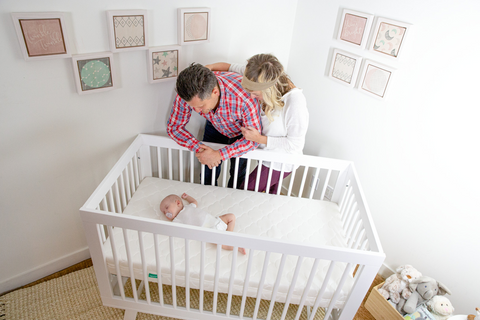
This whole parenting thing is new to you, which is why you might have some concerns and questions when it comes to taking care of your newborn.
Moms and dads are learning as they go, taking bits and pieces of what they’ve heard and observed from others along the way and making their own tweaks here and there to become parenting pros!
If you’re a first-time parent, you’re in the right place. Keep reading for our complete guide for newborn care!
Caring For Your Newborn In The Hospital

One of the most important ways you’ll care for your newborn in the hospital is by feeding them.
Before your baby is born, you’ll likely decide if you want to breastfeed or bottle-feed your baby. But sometimes, mothers who decided to breastfeed end up bottle-feeding their baby and vice versa.
That’s OK! It’s a completely personal decision. But if you choose to breastfeed, the best time to start is within the first hour after your baby is born.
Unfortunately, many mothers and newborns have trouble breastfeeding at first because the baby isn’t latched on correctly. After all, you’re both new at this!
The good news is that while you’re in the hospital, you’ll have access to great help from the nurses and the lactation consultant. They can help you position yourself and your baby correctly, so don’t be afraid to ask.
Lastly, make sure you’re thoroughly informed on the basics when it comes to your baby’s car seat. Before you head home, the hospital will do a car seat check. This is a great time to ask any lingering questions.
Newborn Basics

Feeding Your Newborn
When deciding which feeding route you want to take, remember a fed, happy baby is what matters.
Whether you’re nursing or feeding your baby formula, it’s super important to burp them. If you’re nursing, burp your baby every time you switch sides. If you’re bottle-feeding, burp your baby after every ounce they consume.
If your newborn starts getting fussy while they’re eating, take a break and try to burp them to see if that eases their discomfort.
Additionally, you might sometimes need to disrupt your baby’s peaceful sleep to feed them. Your newborn will need to eat every two to three hours around the clock until they meet or exceed their birth weight.
After your baby has met this goal, there’s no need to wake them up for feedings during the night. They’ll wake up if they’re hungry! (But it’s still important to feed them every two to three hours during the day.)
Breastfeeding
The entire family is on this learning curve together, so check out these tips when breastfeeding your newborn:
- If you have blocked ducts (breasts feel tender and hard), use a warm compress to help get your milk flowing.
- If you’re sore after a nursing session, use a cold compress to ease any breast pain.
- It’s OK to nurse on demand. This way, your baby gets the nutrients they need while also increasing your milk supply to meet your baby’s demands.
- Wait at least three weeks (or until breastfeeding is mastered) before introducing a bottle or paci.
- If you have any questions or problems, call the lactation consultant (their number should be on your discharge papers from the hospital).
Formula Feeding
Because every single baby is different, keep these tips in mind when giving formula to your baby:
- Your baby may react to one type of formula, so try a couple of different ones (reach out to your baby’s doctor for advice on which ones to try first).
- Don’t heat formula in the microwave because this can create heat pockets that could burn your baby.
- Don’t freeze formula because this takes away from the nutritional value.
- Throw away any unused formula.
Changing Your Newborn

Get ready because changing (a lot of) diapers is now part of your daily routine. Newborns tend to have a bowel movement every time they eat, which is anywhere from eight to 12 times per day!
If you’re ever concerned about whether or not your baby is getting enough breastmilk or formula, begin counting their diaper changes.
The amount of wet and dirty diapers they have in 24 hours will give you your answer. (Talk to your baby’s doctor about how many soiled diapers they should have per day.)
And because your baby will go through several diapers each day, changing time can take a toll on their little bottom. After each diaper change, use diaper cream to give your baby’s skin some relief and protection.
Bathing Your Newborn
You may be a little nervous about giving your baby their first bath, but don’t worry. This is a common concern for first-time parents.
Plus, your baby will get a bath in the hospital before they come home, so watch the nurses and take some notes!
However, you won’t be able to give your baby a full, soaking bath until their umbilical cord falls off. Until then, sponge bathe your baby every few days, paying extra attention to their diaper area, eyes, and nose.
Some babies develop baby acne, which we know you probably weren’t expecting until the teenage years!
Fortunately, baby acne is completely normal and will usually go away on its own. In the meantime, be sure to keep your newborn’s skin as clean and moisturized as possible.
Newborn Sleep

If you’ve heard the phrase, “sleep like a baby”, you’re about to find out why people use it! Newborn babies sleep...a lot! And they will do most of this sleeping in your room, at least for the first six months.
The safest sleeping options for your baby are a bassinet, mini crib, or crib.
A bassinet can only be used for a few months, and your baby will eventually grow out of their mini crib, both options save on space. But at some point, your baby will need a crib.
Whether you choose a mini-crib or a crib for your newborn, give them the best sleep possible with a Newton Baby Crib Mattress. It’s breathable and comfortable to help your baby get a safe and sound night’s sleep.
Your newborn baby will take several naps throughout the day with just a little bit of awake time in-between. That’s good because sleep is super important for your baby. It’s when a lot of their growth happens.
If you notice your baby is sleeping a little bit longer than normal for a few days, you probably can chalk it up to a growth spurt.
Even though your baby sleeps around the clock, the newborn days can leave you exhausted. So take the advice: sleep when you can. Mom and dad, your rest is just as important during this time!
Soothing And Bonding With Your Newborn

If your baby starts fussing and you don’t know what to do, try mimicking the womb (a tight and warm space).
The best way to do this is by swaddling your baby. Our Organic Swaddle Blankets keep your baby safe and comfy!
Rock your baby while you hold them in their swaddle, and play some soft music to try to calm them down. If that doesn’t work, try taking them on a walk.
You can also let your little one soak in warm water (after the umbilical cord falls off). Keep a warm towel nearby so you can wrap your baby up after they get out of the water.
All of these ideas are great ways to calm and soothe your baby while bonding with them.
And, of course, snuggling with your baby is always recommended! Those sweet newborn days will pass before you know it, so savor this time with your baby while you can.
Recruit Some Extra Hands
As we mentioned earlier, parenting a newborn is just plain hard. Don’t ever be afraid to ask for help. You’ll definitely need it!
Be clear about what you need help with, whether it’s laundry, dishes, or just a few minutes to yourself.
When To Take Your Newborn To The Doctor
All babies cry. It’s their form of communication, and it doesn’t necessarily mean something is wrong. However, give your baby’s doctor a call if they:
- Have a temperature of 100.4 degrees Fahrenheit or higher (if your baby is younger than two months old)
- Refuse to eat
- Won't wake up to eat
- Cry longer than normal, are unconsolable
- Have a red or swollen rash on their body
- Have redness or swelling near their umbilical cord
- Show pain when having a bowel movement
- Have a distended tummy
- Vomit (not spitting up)
Welcoming Your New Little One

Welcoming your newborn into your growing family is such a sweet feeling! But everyone is figuring out this new journey together, and it may take some time to adjust.
But don’t worry. Feeding, changing, bathing, soothing, and bonding with your newborn will eventually become second nature. You’re going to be a parenting expert before you know it!
In the meantime, remember to recruit some extra hands, and never be afraid to ask for help.
And when it’s time to get a good night’s sleep, make sure your baby is sleeping on a Newton Baby Crib Mattress. With this breathable mattress, you can rest easy at night knowing your baby is snoozing safely!

